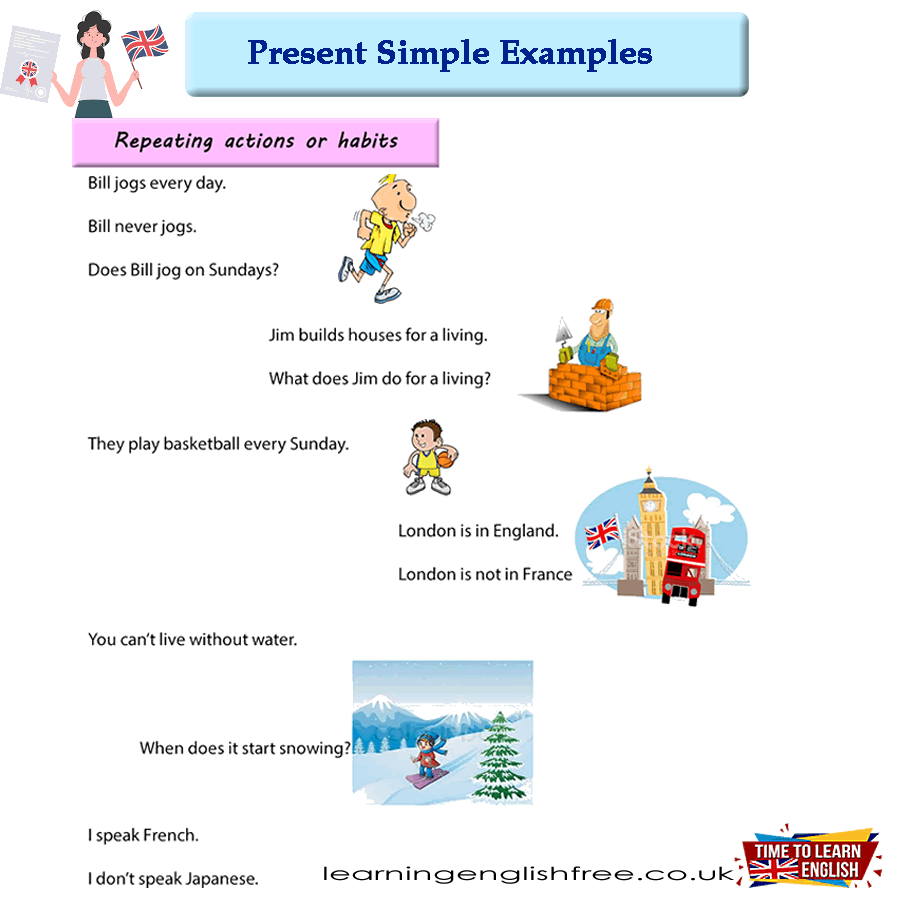
Introduction: Mastering the Present Simple
Welcome to our lesson on the Present Simple tense, an essential part of basic English grammar. This lesson will dive into the uses of the Present Simple tense, helping you understand how to express repeated actions, habits, and general truths. By the end of this lesson, you'll be able to confidently use the Present Simple in your daily conversations and understand when others use it.
Understanding the Present Simple
The Present Simple tense is used to describe actions that are regular, true, or habitual. It's a fundamental tense in English used to express daily routines, general truths, and facts that are always true.
Repeating Actions or Habits
- Example 1: "Bill jogs every day."
- Meaning: This sentence indicates that jogging is a regular activity for Bill.
- Example 2: "Bill never jogs."
- Meaning: This highlights that jogging is not part of Bill's habits.
- Example 3: "Does Bill jog on Sundays?"
- Meaning: This question asks if jogging on Sundays is part of Bill's routine.
Expressing General Truths
- Example 4: "London is in England."
- Meaning: This sentence states a fact that is always true.
- Example 5: "London is not in France."
- Meaning: Here, the Present Simple is used to negate a fact, making it a false statement.
- Example 6: "You can't live without water."
- Meaning: This expresses a general truth about human survival.
Talking About Occupations
- Example 7: "Jim builds houses for a living."
- Meaning: This tells us about Jim’s regular occupation.
- Example 8: "What does Jim do for a living?"
- Meaning: This question inquires about Jim’s habitual work.
Discussing Abilities
- Example 9: "I speak French."
- Meaning: This indicates that the speaker has the ability to speak French.
- Example 10: "I don't speak Japanese."
- Meaning: Here, the speaker negates the ability to speak Japanese.
Understanding Seasonal Changes
- Example 11: "When does it start snowing?"
- Meaning: This question asks about the usual time for a seasonal change.
Hobbies and Leisure Activities
- Example 12: "They play basketball every Sunday."
- Meaning: This sentence shows that playing basketball is a regular Sunday activity.
Conclusion and Takeaways
Today's lesson on the Present Simple tense has equipped you with the knowledge to talk about habits, routines, general truths, and much more. Remember, the Present Simple is all about regularity and facts. To solidify your understanding, try using these examples in your daily conversations or write your sentences using the Present Simple. Practising real-life scenarios will help you grasp this tense more firmly.
Don't forget to share your learning journey with others! Visit our Facebook page at www.facebook.com/learningenglishfree.co.uk for more engaging lessons and practical tips. Let's keep learning together!
